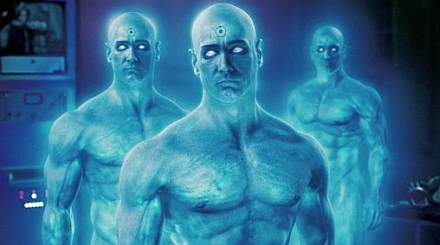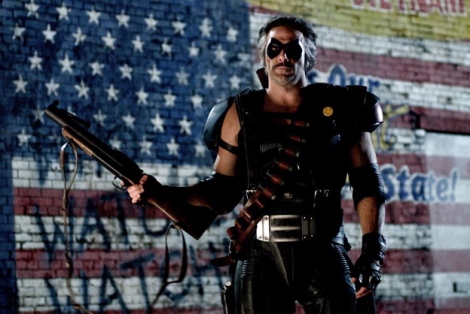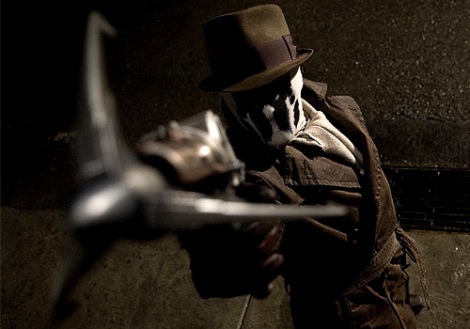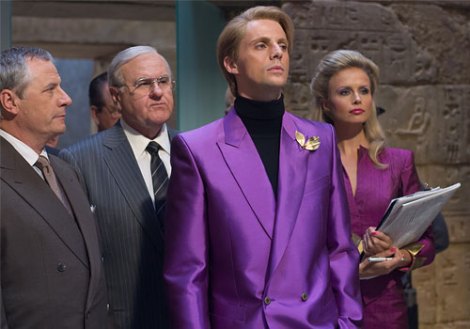Watchmen
Film review by: Witney Seibold

“Watchmen” should be admired merely for its level of ambition. The 1985 Alan Moore graphic novel on which it is based is often hailed – and not just by comic book geeks – as a grand work of literature, which features an alternate 1985 in which Nixon is still president, and real-life superheroes have subtly altered the course of human history. It’s long, bold, tragic, and palpably invokes the Reagan-era Cold War paranoia that was hanging in the air at the time. In the comic, when people talked about the end of the world, it was expressing a fear that was hanging on everyone’s lips.
The 2009 film version of “Watchmen,” directed by Zack Snyder of “300” fame – or perhaps infamy – runs nearly three hours, and attempts to capture every small detail of the comic in an attempt to remain stringently faithful to the source material. Panels of the comic are pretty much untouched in transition to the screen. Nixon is still present, the film still takes place in 1985. The character of Dr. Manhattan is still a glowing blue naked man. About half of the lines of dialogue are transposed directly from the book. Managing to convince studios to make such a large, oddball project, and keeping it so faithful is no small feat. After years of finagling and rewrites, and Alan Moore himself angrily removing his name from this project (as he has done with all other film projects of his work), the film was finally made. Its mere existence is a marvel.
Unfortunately, the aforementioned faithfulness to the source material actually serves to distract from the material rather than enhance it. Rather than use the cinematic form to explore and augment the themes and ideas from the book, Snyder is merely regurgitating them. The literality of the material may please the fanboys who insist on canon over everything else, but it makes for a film that failed to capture the apocalyptic fears of the Reagan era.
There’s an irony in this approach. If you are unfamiliar with the “Watchmen” book, you’ll be impressed by the large ideas on display, but it’s likely you’ll be lost in the labyrinthine story. If you are familiar with the “Watchmen” book, then you’ll only be focusing on what was left out or altered in transition.
I have to admit, I was entertained throughout the film, although I was put off by the overabundance of slick style over gritty tragedy.

But to the story:
In the 1940s, superhero groups started forming in the U.S., led in popularity and usefulness by The Minutemen. By the late 1960s, the Minutemen had all retired, and were replaced by The Watchmen, a group of six costumed crimefighters from various walks of life. They are: The Comedian (Jeffrey Dean Morgan), a sociopath with a lot of guns who secretly worked for Nixon’s cabinet. The Silk Spectre (Malin Ackerman), the daughter of the on the original Minutemen. The Nite Owl (Patrick Wilson), a Batman techie type, also taking on the mantle of the original Minutemen. Ozymandias (Matthew Goode) the smartest man alive. Rorschach (Jackie Earle Haley), a shadow-dwelling vigilante. And Dr. Manhattan (Billy Crudup, mostly rotoscoped) the only one in the group who has any real superpowers; he glows blue, can manipulate matter with his mind, and seems to be something more than human.
By 1985, our heroes have been forced into retirement. Rorschach still prowls the streets illegally. The Nite Owl has become a middle-aged has-been. The Silk Spectre lives an unhappy relationship with Dr. Manhattan, who has taken to scientific research, and is quickly losing his grip on anything human. Ozymandias has old out, becoming an ultra-rich master of industry, complete with the rights to a Watchmen toy line. And as for the Comedian, well, our story begins when The Comedian is murdered by a mysterious assailant.

While The Comedian’s connection to the Nixon administration is readily to blame for his death (it’s said in the film that he killed both JFK and those Woodward and Burnstein fellows), Rorschach believes that all former superheroes are at risk, and attempts to warn the others. None of them are, however, really interested in hearing him, and few of them want anything to do with the others. Each of them works through their apathy in their own way as the plot, of course, thickens.

Like I said, I hugely admire the ambition of making a “Watchmen” film watchable. The execution, sadly, left a lot to be desired.
First, and this may seem like a small details, but it was certainly noticeable: The music selection in “Watchmen” was obvious and awful. The films starts with Bob Dylan’s “The Times, They Are A-Changin’,” which is fine, but them moves to “Sounds of Silence,” “All Along the Watchtower,” Wagner’s “Ride of the Vakyries,” and Leonard Cohen’s version of “Hallelujah.” Cohen’s “First We Take Manhattan” played over the film’s credits. For a film that took place in 1985, the music department seemed to take a lot of time making sure the 1960s and ‘70s were evoked. Nena’s “99 Red Balloons” was featured, but I think that was the only ‘80s tune. I wish more effort had been taken to bring us musically to Ronald Reagan; where’s the punk rock? And why include “Valkyries” and “Silence” when they are more likely to invoke thoughts of “Apocalypse Now” and “The Graduate” respectively, rather than any sort of mood?
Second, the film insists that it is gritty. There is violence, depression, suicide. The world is practically noir. Snyder, however, did not bring nourish expressionism to this film, nor did he try to blend the dark crime world with a sense of overriding reality. He, instead, made the same approach he did in his “300:’ ultra-stylized. Everything was colorful, glitzy, and strangely cartoonish. To be fair, it is based on a comic, but I think the more wise approach would have been to focus less on the literal images of the comic, and more on the themes; too much effort went into pleasing the fanboys, and not enough to please the intellect.

Third, the film talks a lot about the Russians and nuclear holocaust, but I never once felt the dread that the characters claimed to feel. In 1985, from what I recall (I was only 7 at the time), end-of-the-world fear was a very real thing. The U.S. was feeling a combination of selfish looking out for #1, and a hopeless nihilism. The characters in “Watchmen” did seem somewhat nihilistic, but it was nihilism without a direction, if that makes any sense.
NOTE: In this following paragraph, I will discuss the film’s ending. Please skip it if you want the ending to be a surprise.
Expounding from above, the lack of any real-life dread actually threw into question the film’s entire moral center. At the end of the film, Ozymandias has elected to bring about world peace by killing millions of people, and framing Dr. Manhattan. If the world is focussed in its hatred toward a strange blue superhuman, they will lay down their arms. In a Cold War situation, the killing of millions to save billions was a choice leaders were likely faced with; it wasn’t merely academic in 1985. The film takes all the political and moral power from the ethics of killing, and shifts it to the realm of mere postulation. It’s less a tough question demanding an answer, and more of a classroom exersize.
Fourth, the casting of comedienne Malin Ackerman (from “The Heartbreak Kid” remake, and various TV projects) was a strange choice. Ackerman is pretty, and has lovely breasts, but I think she was a little out of her depth.
Speaking of those breasts, did anyone else notice that the film’s sex scene aboard The Nite Owl’s flying Owl Craft was almost, shot-for-shot and position-for-position, identical to the sex scene in Snyder’s “300?” And did anyone else notice that Ackerman’s breasts were identical to the breasts belonging to Lena Heady, who played Gorgo in “300?” I made this observation in my review of Paul Verhoeven’s “Black Book,” but certain directors seem to be attracted to, and only feature in their films, a very certain kind of breast. Which begs the question: how do you audition for your type of breast?
But I digress.
Ultimately, “Watchmen” was, at once, strangely made, entertaining, impressive, gorgeous, and off-putting. I’m not sure if I can go so far as to recommend it, but I can’t fault you if you’re curious enough to see it.
OMG I noticed the sex-scene being almost exactly the same as in the novel, too…oh, and thanks for not mentioning “blue penis.” I swear, if one more review went on about that…ugh.
But yes, you are fairly spot on with this: “There’s an irony in this approach. If you are unfamiliar with the “Watchmen” book, you’ll be impressed by the large ideas on display, but it’s likely you’ll be lost in the labyrinthine story. If you are familiar with the “Watchmen” book, then you’ll only be focusing on what was left out or altered in transition.”